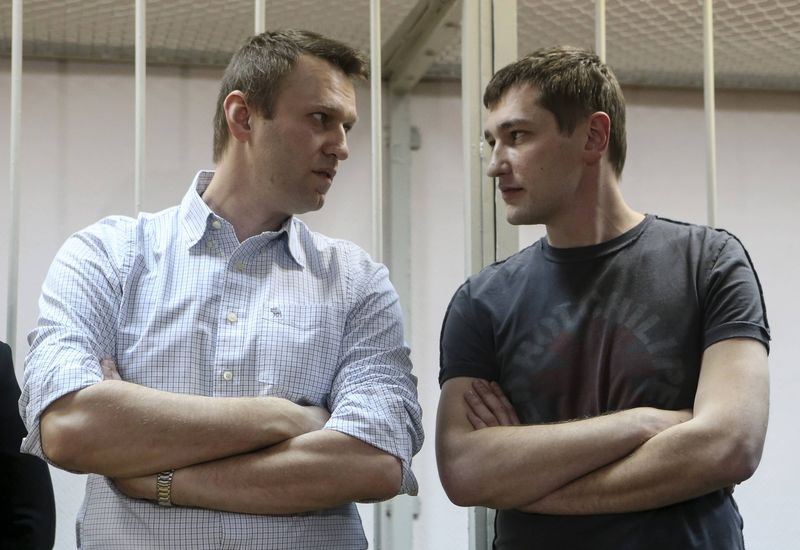By Maria Tsvetkova
MOSCOW (Reuters) - A Russian court gave Kremlin critic Alexei Navalny a suspended sentence on Tuesday for embezzling money but jailed his brother for three and a half years in a case seen as part of a campaign to stifle dissent.
Navalny led mass protests against President Vladimir Putin three years ago, when tens of thousands took to the streets in Moscow and St Petersburg to protest against corruption in his government and inner circle. Opposition figures say jailing Navalny risked a new wave of protests and so it was decided to punish him by jailing his brother instead.
Navalny's supporters will gather in front of the Kremlin later on Tuesday with some 17,000 people having registered on Facebook to attend although the numbers may be smaller as people prepare to celebrate the New Year. The authorities have not given permission for the rally so it is considered illegal and there maybe arrests.
The Navalny brothers, Alexei and Oleg, were accused of stealing 30 million roubles, around $500,000 at the current exchange rate, from two firms including an affiliate of the French cosmetics company Yves Rocher between 2008 and 2012.
Tuesday's ruling will come as a relief for Navalny's supporters after prosecutors asked that he be imprisoned for 10 years.
The Kremlin denies allegations that it uses the courts to persecute opponents.
Officials have taken few steps to investigate Navalny's corruption allegations. He claimed there was mass embezzlement, including in state bank VTB (MM:VTBR) and pipeline monopoly Transneft, run by close allies of Putin.
"Aren't you ashamed of what you are doing?" Navalny told the court and judge Yelena Korobchenko. "Why are you putting him (my brother Oleg) in prison? To punish me even harder?"
Currently under house arrest, Alexei Navalny is serving another suspended five-year jail term for a separate conviction last year, which critics also called a sham.
"The authorities are torturing and destroying relatives of their political opponents. This regime doesn't deserve to exist, it must be destroyed," Navalny told reporters outside the court as he was escorted in a car for prisoners.
Russian state television channels were not covering the sentencing or mentioned it very briefly, while most Russian print media or radio stations had it among their top stories.
Putin's spokesman Dmitry Peskov declined to comment and said the president would find out about the verdict from media.
Putin's popularity has soared over the past year after Moscow's annexation of Ukraine's Russian-speaking Crimea peninsula and its incursion in east Ukraine, which led to the worst stand-off with the West since the end of the Cold War. This has eroded the popularity of opposition leaders such as Navalny.
However, falling oil prices and Western sanctions on Russia over Ukraine have triggered a deep economic crisis, a rouble devaluation and double-digit inflation, threatening Putin's reputation for safeguarding Russian prosperity.
Former Finance Minister Alexei Kudrin, one of the most respected Russian economists in the West, said this month Russia was facing a full-fledged crisis which could lead to mass protests next year.
"The authorities could have easily put Navalny in jail. But they understand that it would have led to a large wave of protests. So they will torture him through other means," economist and former central banker turned opposition figure, Sergei Aleksashenko, told independent television channel Dozhd.

Lawyers for Oleg Navalny said they didn't know where exactly he would be sent to serve his prison term. Putin's critic and billionaire Mikhail Khodorkovsky served his 10-year jail term in penal colonies from northern Russia to east Siberia.
(Writing by Dmitry Zhdannikov; Editing by Dominic Evans and Anna Willard)